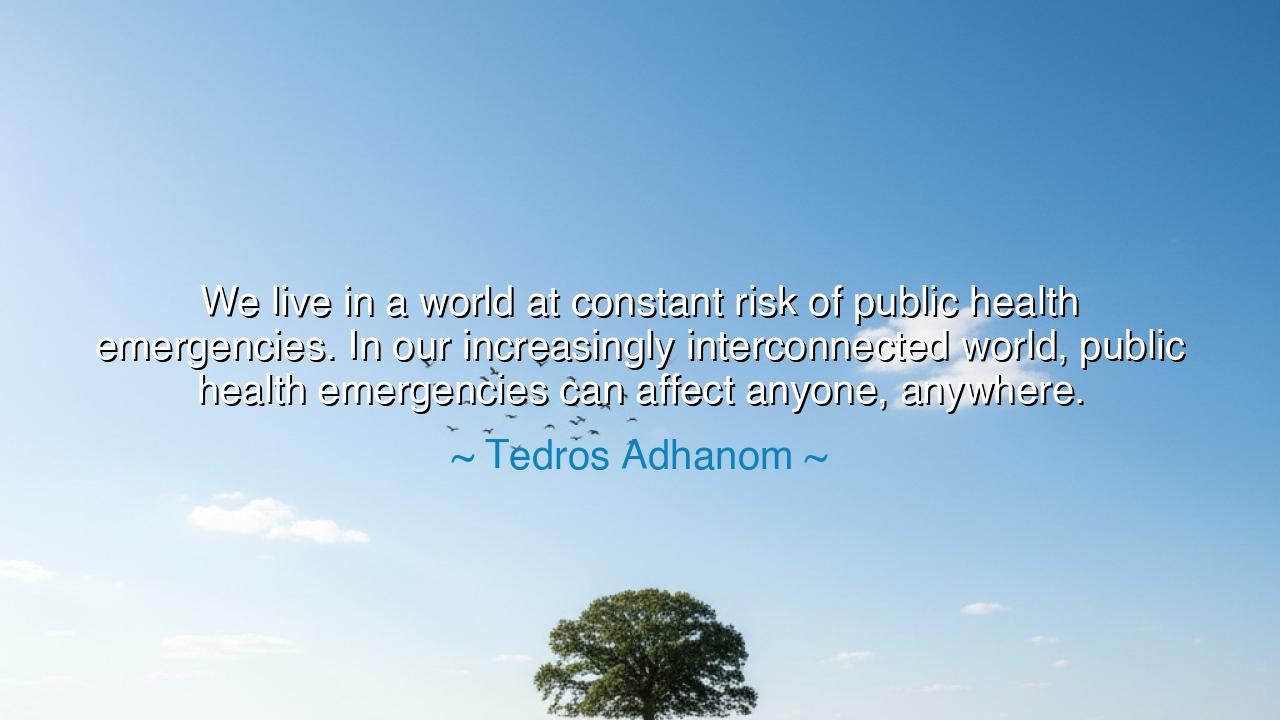
We live in a world at constant risk of public health emergencies.
We live in a world at constant risk of public health emergencies. In our increasingly interconnected world, public health emergencies can affect anyone, anywhere.






“We live in a world at constant risk of public health emergencies. In our increasingly interconnected world, public health emergencies can affect anyone, anywhere.” Thus spoke Tedros Adhanom, a healer and leader of the nations, whose voice carries both warning and wisdom. His words are not mere reflection, but a call — a reminder that humanity, in all its triumph and technology, remains bound by a single truth: we are one body, and the sickness of one limb can spread to all. In an age where borders blur and distances vanish, the health of each is tied to the health of all. What once could be contained by mountain, ocean, or kingdom now travels with the swiftness of wind — a whisper of contagion that can circle the Earth in days.
In the ancient world, the wise understood the fragility of life. The physicians of Greece, the healers of Egypt, and the scholars of India all knew that the balance between wellness and ruin could be undone by unseen forces. The plagues of old came not with warning but with fire and fear: the Plague of Athens, which struck during the height of democracy; the Black Death, which humbled kings and peasants alike. In those dark days, men learned that no wall, no army, no crown could protect against the invisible. The lesson was simple and eternal — that in the face of disease, humanity’s divisions are meaningless. Yet even now, in our age of science and speed, we are tempted to forget this truth, until the earth reminds us again through sorrow.
When Tedros Adhanom, Director-General of the World Health Organization, spoke these words, he spoke from the furnace of experience — from the struggles of nations to unite against the COVID-19 pandemic, from the scars of Ebola and the warnings of Zika. His voice rose from the crossroads of history, where humankind stands more connected than ever, yet still too often divided in spirit. He reminds us that our interconnected world, while a marvel of progress, is also a bridge for peril. The same ships that carry trade carry infection; the same planes that bring reunion bring risk. The blessing of connection is also the burden of responsibility.
The story of the 2014 Ebola outbreak stands as a living parable of Tedros’s warning. In a small village in West Africa, a single case of infection grew into an inferno that crossed nations. For months, the world hesitated, watching from afar as if distance could grant safety. But soon, the illusion of isolation shattered. Fear spread faster than the virus; economies trembled; borders closed. And yet, amid despair, hope was reborn — not through isolation, but through unity. Doctors from every corner of the globe came together; communities learned to protect one another; science joined with compassion. The plague was overcome not by the strength of one nation, but by the courage of many acting as one.
Thus, the ancient truth lives anew: the health of the many is the shield of the one, and the health of the one is the seed of the many. In a world where every breath, every touch, every journey binds us together, public health is not a task for governments alone, but a covenant among peoples. The air you breathe, the water you drink, the hands that heal you — all flow from the same source. To neglect this bond is to invite ruin; to honor it is to ensure life’s continuity. As the ancients tended their sacred fires to preserve warmth for the tribe, so must we tend the flame of collective health to preserve the life of our shared world.
Yet Tedros’s wisdom reaches beyond illness. His words remind us that the fragility of health mirrors the fragility of peace, of climate, of truth itself. Just as a virus can cross oceans, so can fear, hatred, and ignorance. We are not separate nations scattered across the earth, but threads woven into the same tapestry. The well-being of one thread strengthens the whole; the decay of one weakens all. Interconnection is not merely a fact — it is a destiny. To deny it is to blind oneself to the essence of our age.
Therefore, let this be the lesson carried forward: vigilance and unity are the guardians of our future. Do not wait until disaster awakens compassion — live with awareness now. Care for the stranger as for your own kin, for in doing so you protect your own life as well. Support systems of health, honor the healers, and cherish truth over fear. For it is not wealth, power, or isolation that will preserve humankind, but solidarity — the wisdom of knowing that your breath is my breath, your safety my safety.
So remember the words of Tedros Adhanom, and let them guide your steps as both warning and hope: “Public health emergencies can affect anyone, anywhere.” Guard your world as a shared home. Tend to it with care, wisdom, and compassion. For the fate of humanity, like the rhythm of the heartbeat, depends upon the harmony of all its parts — one world, one people, one fragile, enduring life.






AAdministratorAdministrator
Welcome, honored guests. Please leave a comment, we will respond soon